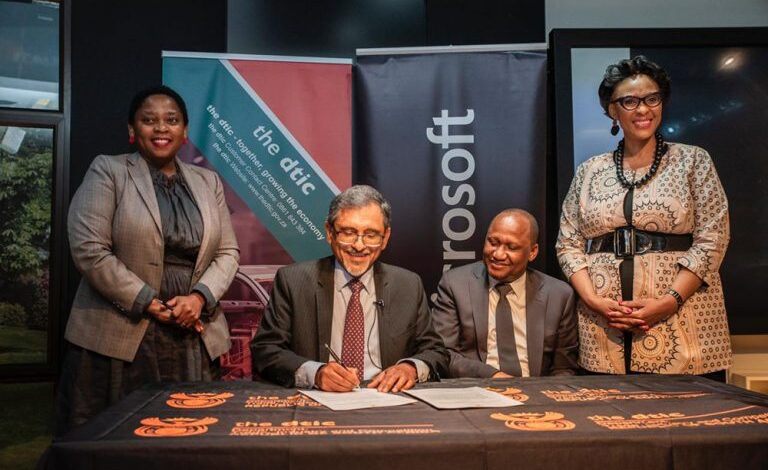Microsoft Agrees To A R1.3 Billion Landmark Investment To Empower Black-Owned Businesses

Microsoft Agrees To A R1.3 Billion Landmark Investment To Empower Black-Owned Businesses. Microsoft and the Department of Trade, Industry and Competition (the dtic) has agreed to a R1.32 billion investment to be deployed over the next ten years in the development of black-owned SMMEs in both tech and non-tech sectors. The agreement makes provision for skills development of young black South Africans in emerging technologies and includes a commitment to research and development to prepare South African industries for the fourth industrial revolution (4IR).
The investment, facilitated under the Equity Equivalent Investment Programme (EEIP) provisions of the Broad-Based Black Economic Empowerment Act (B-BBEE Act) is designed to provide multinationals like Microsoft, which are not able to facilitate local ownership in their companies, with an avenue to accrue BEE points through the pursuit of objectives like enterprise and supplier development; skills development; and research and development for black South Africans.
In terms of the agreement, the Microsoft R1,3 billion commitment will be allocated as follows: An enterprise development initiative, estimated to be R663 million, with a portion focused on technology start-ups owned and operated by black South African entrepreneurs and development of new solutions in disruptive technologies; and a portion focused on companies not in the technology sector, encouraging greater use of technologies like machine learning and other forms of artificial intelligence (AI) by black-owned SMEs; A skills development initiative, estimated to be R347 million will focus on providing intensive training to young black South Africans through 8 – 12 month certification courses and learnerships which will see about 1 000 beneficiaries accredited with certifications in emerging technologies, like AI and data analytics; and an R&D initiative, estimated to be R160 million, which will invest in research programmes. This includes a R50 million investment which will be spent in consultation with the Localisation Support Fund to introduce emerging technologies into industrialisation and localisation initiatives.
The investment by Microsoft adds to the growing number of agreements concluded during the past five years of the 6th Administration in terms of the EEIP provisions of the B-BBEE Act, which includes the R6 billion Automotive Industry Transformation Fund, committed to by seven large car assemblers, BMW, Ford, Isuzu, Mercedes-Benz, Nissan, Toyota and Volkswagen; a R384 million investment by Amazon Web Services; a R340 million fund established by JPMorgan; and a R200 million grant by Citibank for black-industrialists in the Vaal Special Economic Zone.
“South African law permits, in specific circumstances, that foreign investors who are unable to include black South Africans in their ownership structures, nonetheless gain points on the BEE scorecard by developing what is called an ‘equity equivalent’ investment plan that is then considered by Government. Such a Plan typically deals with pursuit of transformation objectives like enterprise and supplier development; skills development; and research and development that brings black South Africans into the mainstream economy. It is part of the flexibility that was introduced to enable foreign-owned businesses to operate in the domestic environment,” Minister of Trade, Industry and Competition Ebrahim Patel said today.
“The R1,3 billion Microsoft deal, the largest by a single company under the equity equivalent provisions of the legislation, brings the total value of agreements concluded during this administration to more than R8.2 billion. Since we started the Black Industrialist Programme eight years ago, we have built a network of more than 1 700 black-owned and controlled industrial champions which have been backed by the dtic and its agencies. These firms employ more than 160 000 South Africans directly. The Microsoft Fund will assist in accelerating the development of black industrialists, equipping them with the technology needed to thrive in the Fourth Industrial Revolution,” he said.
“The Fund will assist black South Africans in non-tech sectors to harness the power of technology and improve their competitiveness and ability to innovate and expand their operations. It will also act as a bridge to enable young people to get training, certification and job-placement, so that talented South Africans gain access to the opportunities that arise from an increasingly digitalised world,” Minister Patel said. According to Lilian Barnard, President for Microsoft Africa, “This investment represents our commitment to empowering individuals and small businesses to be part of Africa’s digital economy, and to drive job creation and growth that will benefit the entire region.”




